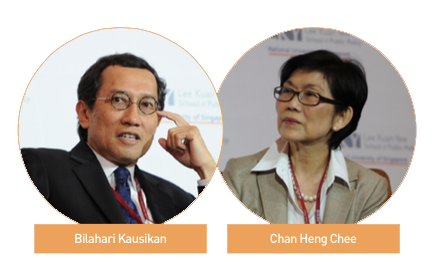
This panel discussion was part of the LKY School 9th Anniversary Conference held on 16 September 2013 at the Shangri-la Hotel. In Part Five of this conference, speakers Bilahari Kausikan, Ambassador-at-Large, and Ambassador Chan Heng Chee talked about geopolitics and Singapore. The moderator is Kishore Mahbubani, Dean of LKY School of Public Policy. The video link is available here. For upcoming events by the School, please visit our website.
The panel on geopolitics stood out as the only one dealing with non-domestic issues among the conference four panels. However, as the speakers point out, the distinction between domestic and foreign policy has always been a thin line for Lee Kuan Yew.
For Professor Chan Heng Chee, acting based on the interdependency of the domestic and the foreign was one of most important ideas in LKY’s thinking on Singapore. Domestic policy success in terms of economic and social progress was a precondition for Singapore
to be taken seriously on the world stage.
Both speakers credited Mr Lee for his clearly-articulated principles on Singapore’s foreign policy, which established very early during his premiership in 1965, at time where small nations were a rarity in the membership of the United Nations.
Framed as a trenchant a “survival strategy for small states”, Professor Chan said that first, there was “protective shield” of multi-culturalism and multi-racialism as a national ideology. This guards against foreign exploitation of power or ideological
interests. Second, there was a broad concept of making Singapore relevant so that world powers would engage with it, and at the least, not harm it. Third, the small city-state needs to stay in a position where it has “overwhelming power” on its side
– if or when it might need it.
Mr Kausikan admits there is no easy concept that defines Mr Lee’s approach. “An international relations theorist would no doubt call Mr Lee a realist. But no simplistic label can do justice to the eclectic complexity of his approach towards international
relations and geopolitics,” he said.
While Mr Lee was an idealist who was prepared to risk his life for his beliefs, he was also a pragmatic man who did what was practical at a point in time, rather than wait for ideal conditions.
“Mr Lee’s ‘big idea’ was Singapore. On that he always thought big: Singapore as we know it today would not otherwise exist.”
These principles for survival were not merely lip service but were evident in Mr Lee’s political decisions. In defiance of the strongest pressures from large states, Singapore remained unwavering in its determination to defend its sovereignty and national
interests. As Mr Kausikan said, Mr Lee has “hammered” into the Foreign Ministry that they were not in the diplomatic service “to be nice” but to safeguard the interests of Singapore.
Both speakers alluded to a number of instances in which Mr Lee stood firm to maintain the Singaporean interests against other powerful countries or strong public opinion. One such episode was pursuing capital punishment following the MacDonald House bombing
by two Indonesian marines in 1965 – despite the explicit request for release by Indonesia’s president Sukarno. LKY needed to maintain the integrity of Singapore. However, he later symbolically placed flowers on the graves of the marines. At other instances
he would not, like in 1994, give in to US complaints against the caning of a US citizen who vandalised in Singapore.
Long before the most current focus on the tense and competitive relationship between the US and China came to dominate global relations, Mr Lee had been working intensely with leaders of the two countries.
Mr Lee, who only learned Chinese in his 30s, would eventually convince China’s Deng Xiaoping to stop supporting Maoist insurgencies across South East Asia. During all his time, Lee attempted to maintain equidistance to China and the US. Many even argue
that LKY has served as an important translator between leaders of the two countries who have had so little understanding of each other at important times.
“Lee Kuan Yew has made many efforts to help the West understand China; equally, he has sought to explain the United States in all its contradictions to the Chinese. Mr Lee was sometimes speaking for one side, at other times for the other. Singapore’s
foreign policy is best served by ensuring that views going in the wrong direction do not go unchecked,” she said.
_____________________________________________________________________________________
Jan Seifert is a PhD Student at the LKY School.